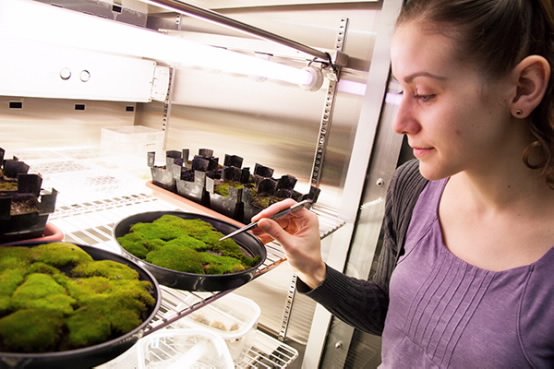Displaying items by tag: Chile
Dr Melinda Waterman
|
I am an early career biotechnologist examining the secondary metabolites and protective mechanisms of moss species that live in temperate and Antarctic regions. I recently completed my PhD in the biology and chemistry of Antarctic moss species, with a focus on their natural protective mechanisms and how old living moss shoots from Antarctica can be. I am interested in the protective mechanisms employed by plants, in particular mosses, and how they cope in different stressful situations, e.g. UV radiation, water stress and high light. My research interests include but are not limited to climate change, plant ecophysiology, radiocarbon dating and natural products spanning across many disciplines within science. Ph: 02 4221 5373 Position: Research Associate / Associate Lecturer
|
 |
Experiments in a natural cooler
Our time on King George Island is coming to an end and we are wrapping up some experiments that were focusing on salt, temperature, light and water stresses.
Cooking up a storm in Antarctica
Sundays are days off for the chefs here at Base Escudero and so research teams can use this opportunity to show off their culinary skills. Our group stepped up to the challenge last week and cooked a delicious lunch for 30 hungry workers and scientists.
King George Island, one year later.
I am lucky to participate in another research trip to King George Island (KGI), West Antarctica organised by the Instituto Antartico Chileno. Last year Sharon, Andrew and I were part of a group of scientists from a diverse range of countries lead by Angélica Casanova-Katny. This time around I am accompanying Gustavo, Tavo and Marisol from USACH as part of my Endeavour program.
Dr Mel is in Antarctica
Dr Mel has been in Antarctica for over a week now and we are hoping there will be updates and exciting news but unfortunately the internet is slow (probably doesn't like the cold) and so she is sending messages via whats app. Luckily there is mobile phone coverage on King George Island! Looks like Tavo is on the phone in the lab here.
End of year celebrations in Santiago
I might be a little late to blog about this but it has been a busy last few weeks. The Facultad de Quimica y Biologia at USACH had a successful end to 2015 and put on a lunch with finger-food, including mini empanadas (empanaditas). I attended the New Year’s fireworks at Los Dominicos, Santiago with my host supervisor’s family. We dressed up in silly hats and of course glow sticks, drank champagne and exploded the largest hand held party poppers I’ve seen. Both were fun events to cap off a great year for research and achievements.
A weekend in Concepción
I arrived in Concepción in the middle of December to see Angelica and her student, Paz, to collect Antarctic moss samples and prepare instruments to record weather conditions in Antarctica.
A big thank you to USACH
After almost a month visiting the Facultad de Quimica y Biologia (Faculty of Chemistry and Biology) at the Universidad de Santiago de Chile it was time for me to come back home. On my last day at the University I gave a lecture to an Undergraduate Class and then in the afternoon the lab prepared a Chilean speciality as a farewell lunch. We had heard a lot about completos but this was our first taste of the real thing.
Amazing plants in the Atacama desert, Chile
To celebrate Melinda getting her PhD we took a weekend break in the Atacama Desert. We are very used to cold deserts but this was a whole other experience. Really dry, salty and hot and very high altitude so burning UV radiation. So can plants survive there? Of course they are so tough. Some parts were so dry we didn't see much vegetation but wherever there was a bit of water we saw plants.
